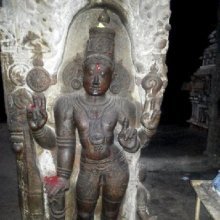Agamashastra, Āgamaśāstra, Agama-shastra: 6 definitions
Introduction:
Agamashastra means something in Hinduism, Sanskrit. If you want to know the exact meaning, history, etymology or English translation of this term then check out the descriptions on this page. Add your comment or reference to a book if you want to contribute to this summary article.
The Sanskrit term Āgamaśāstra can be transliterated into English as Agamasastra or Agamashastra, using the IAST transliteration scheme (?).
Images (photo gallery)
In Hinduism
Vedanta (school of philosophy)
Source: archive.org: Preceptors of AdvaitaĀgamaśāstra (आगमशास्त्र) (or Gauḍapādakārikā) is the name of a philosophical work attributed to Gauḍapāda.—After he was blessed with the intuitive wisdom of the Absolute, must have taught those who gathered round him the truth he had discovered and embodied it in a work which came to be called the Āgamaśāstra or Gauḍapāda-kārikā. It is an exposition of a short but important Upaniṣad called the Māṇḍūkya, which is counted as one of the principal Upaniṣads by all the schools of Vedānta. Besides the Māṇḍūkyakārikā, other works are also attributed to Gauḍapāda.

Vedanta (वेदान्त, vedānta) refers to a school of orthodox Hindu philosophy (astika), drawing its subject-matter from the Upanishads. There are a number of sub-schools of Vedanta, however all of them expound on the basic teaching of the ultimate reality (brahman) and liberation (moksha) of the individual soul (atman).
Shaktism (Shakta philosophy)
Source: Shodhganga: Kasyapa Samhita—Text on Visha Chikitsa (shakta)Āgamaśāstra (आगमशास्त्र) is another name for Tantra (“the ancient Indian philosophy that combines Mantras and Yantras”).—The Kulārṇava Tantra mentions that each yuga or age has its scripture. The Satya-yuga had the Vedas. The Treta-yuga had the Smṛtis. The Dvāpara-yuga had the Puraṇas to educate people about the Vedic doctrines in the garb of myths and tales. The Kali-yuga, has the Tantra or Āgamaśāstra.—The followers of the Tantraśāstra contend that, in the age of Kali, when humanity is bogged down with the unbearable baggage of adharma and asatya, it is impossible to perform the rigorous rituals and austerities prescribed in the Vedic tradition. People have little time to indulge in such rigorous spiritual pursuits as most of it is diverted towards materialistic, day-to-day needs. It is here that the Tantra or Āgamaśāstra steps in and provides practical guidance to mankind to achieve the puruṣārthas of dharma, artha, kāma and mokṣa.

Shakta (शाक्त, śākta) or Shaktism (śāktism) represents a tradition of Hinduism where the Goddess (Devi) is revered and worshipped. Shakta literature includes a range of scriptures, including various Agamas and Tantras, although its roots may be traced back to the Vedas.
Languages of India and abroad
Sanskrit dictionary
Source: DDSA: The practical Sanskrit-English dictionaryĀgamaśāstra (आगमशास्त्र).—Name of a supplement to the माण्डूक्योपनिषद् (māṇḍūkyopaniṣad).
Derivable forms: āgamaśāstram (आगमशास्त्रम्).
Āgamaśāstra is a Sanskrit compound consisting of the terms āgama and śāstra (शास्त्र).
Source: Cologne Digital Sanskrit Dictionaries: Aufrecht Catalogus Catalogorum1) Āgamaśāstra (आगमशास्त्र) as mentioned in Aufrecht’s Catalogus Catalogorum:—See Gauḍapādīyabhāṣya.
2) Āgamaśāstra (आगमशास्त्र):—by Gauḍapāda. Cs 3, 59 (Prakaraṇa 2 and 3 wanting). C. by Śaṅkarācārya. Cs 3, 38 (first Prakaraṇa). 3, 59 (Prakaraṇa 2 and 3 wanting). Cc. by Ānandatīrtha. Cs 3, 59 (Prakaraṇa 2 and and 3 wanting).
Source: Cologne Digital Sanskrit Dictionaries: Monier-Williams Sanskrit-English DictionaryĀgamaśāstra (आगमशास्त्र):—[=ā-gama-śāstra] [from ā-gama > ā-gam] n. ‘a supplementary manual’, Name of a supplement to the Māṇḍūkyôpaniṣad (composed by Gauḍa-pāda).
[Sanskrit to German]
Sanskrit, also spelled संस्कृतम् (saṃskṛtam), is an ancient language of India commonly seen as the grandmother of the Indo-European language family (even English!). Closely allied with Prakrit and Pali, Sanskrit is more exhaustive in both grammar and terms and has the most extensive collection of literature in the world, greatly surpassing its sister-languages Greek and Latin.
See also (Relevant definitions)
Partial matches: Shastra, Agama.
Starts with: Agamashastravivarana.
Full-text: Agama, Mandukya Karika, Tantra, Gaudapadakarika, Gaudapada acarya, Gaudapada, Shilpin, Tantrashastra.
Relevant text
Search found 11 books and stories containing Agamashastra, Āgamaśāstra, Agama-shastra, Āgama-śāstra, Agamasastra, Agama-sastra; (plurals include: Agamashastras, Āgamaśāstras, shastras, śāstras, Agamasastras, sastras). You can also click to the full overview containing English textual excerpts. Below are direct links for the most relevant articles:
Mahayana Buddhism and Early Advaita Vedanta (Study) (by Asokan N.)
Chapter 4.11 - Reality in Advaita (a): The Sources of Gaudapada’s Philosophy
Chapter 3.1 - The Mandukya-karika or Gaudapadiya-karika
Consciousness in Gaudapada’s Mandukya-karika (by V. Sujata Raju)
Chapter 2: A Study of Māṇḍūkya Kārikā and its Origin
Critique of various theories of causation < [Chapter 6: A Study of Māṇḍūkya Kārikā: Alātaśānti Prakaraṇa]
Cidgaganacandrika (study) (by S. Mahalakshmi)
Verse 184 [Eligibility for attainment of release from Saṃsāra] < [Chapter 4 - Fourth Vimarśa]
Yoga Vasistha [English], Volume 1-4 (by Vihari-Lala Mitra)
Chapter CLXXIII - Brahma gita or a lecture on spirituality < [Book VII - Nirvana prakarana part 2 (nirvana prakarana)]
Book Reviews < [April – June 1992]
Book Reviews < [April – June, 1997]
Thyagaraja and the Bhakti Movement < [February 1937]
Temples of Munnur (Historical Study) (by R. Muthuraman)

